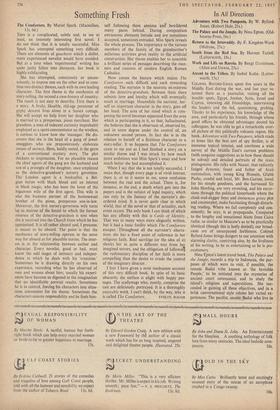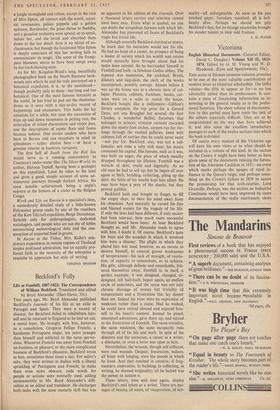In All Directions
Adventure with Two Passports. By W. Byford- Jones. (Robert Hale, 21s.)
Return to the Irrawaddy. By F. Kingdon-Ward. (Melrose, 25s.) South from the Red Sea. By Haroun Tazieff. (Lutterworth, 18s.) Work and Life on Raroia. By Bengt Danielsson. (Allen and Unwin, 25s.) COLONEL BYFORD-JONES spent five years in the Middle East during the war, and last year re- turned there as a journalist, visiting all the trouble spots, Egypt, Jordan, Syria, Israel and Cyprus, renewing old friendships, interviewing the leaders and the led, questioning, probing. Thanks to his experience, his knowledge of the area, and particularly his friends, through whose good offices he obtained advantages denied his colleagues, he was able to get a remarkable over- all picture of this politically volcanic region. His book, Adventure with Two Passports, which reads at times like the best sort of spy thriller, is of immense topical interest, and combines a wide survey of the Middle East's current problems (with sanguine suggestions as to how these should be solved) and detailed portraits of the main protagonists. His talks with Nasser, that radiantly fanged dynamo, fount and father of Arab nationalism, with young King Hussein, Glubb Pasha, candid and loyal, Mr. Ben-Gurion, loved for his simple goodness, and the harrassed Sir John Harding, are very revealing, and his excur- sions through the political hinterlands where the cloak-and-dagger boys and eminences grises plot and counterplot, make fascinating though disturb- ing reading. Where we fail completely and con- sistently, he says, is at propaganda. Compared • to the lengthy and sensational blasts from Cairo radio, so similar to Moscow's as to be practically identical (though this is hotly denied), our broad- casts are of unsurpassed feebleness. Colonel Byford-Jones brings dangers to our attention with alarming clarity, contriving also, by the liveliness of his writing, to be as entertaining as he is pre- cautionary.
Nina Epton's latest travel book, The Palace and the Jungle, records a trip to Indonesia, the pur- poses of which were to visit, if possible, the remote Badui tribe known as 'the Invisible People,' to be initiated into the mysteries of ancient court ceremonial, and to study the island's religions and superstitions. She suc- ceeded in gaining all these objectives, and in a brisk conversational style relates her varied ex- periences. The pacifist, ascetic Badui who live in a jungle stronghold and refuse, except in the case of Miss Epton, all contact with the world, mysti-
cal ceremonies, palace puppets and a golden spittoon, Borobodur, the great shrine to Buddha, and a gamelon orchestra were spread, so to speak, befoie her, and she loved and absorbed them down to the last detail. Java is an island of en- chantments, but though the fascinated Miss Epton is deeply conscious of this her writing fails to communicate its magic. The scent of the frangi- pani blossoms seems to have been swept away by her fresh-blowing style. As for Mr. Kingdon-Ward's long, beautifully photographed book on the North Burmese back- woods into which he and his wife journeyed on a botanical expedition, it is, to the uninitiated— though probably only to them—too long and too botanical. One of the most famous botanists in the world, he has tried to pad out the rhododen- drons as it were with a day-to-day record of happenings and encounters. This holds the lay attention for a while, but soon the succession of trips up and down mountains in pelting rain, the reiteration of minor discomforts and major joys, and the descriptions of exotic flora and fauna become tedious. One envies readers who have
been to Burma and can recapture in mind its splendours — rather elusive here — or have a genuine interest in bauhinia variagata. The first half of South from the Red Sea would serve as a running commentary to Cousteau's under-water film The Silent World, its
author, Haroun Tazieff, having been a geologist on this expedition. Later he takes to the land and gives a good, simple account of some ad- venturous journeys through darkest Africa, his most notable achievement being a night's sojourn at the bottom of a crater in the Belgian Congo.
Work and Life on Raroia is a specialist's item, a meticulously detailed study of a little-known Polynesian group made by one of the members
of the Kon-Tiki raft expedition, Bengt Danielsson. Suitable only for anthropologists, dedicated sociologists, and people who are not shy of tables summarising meteorological data and the con- sumption of imported food in grams.
In Ascent to the Tribes, Mrs. Kuhn's mis- sionary experiences in remote regions of Thailand inspire profound admiration, but an equally pro- found faith in the necessity of the enterprise is requisite to appreciate her style of writing.
VIRGINIA GRAHAM











































 Previous page
Previous page